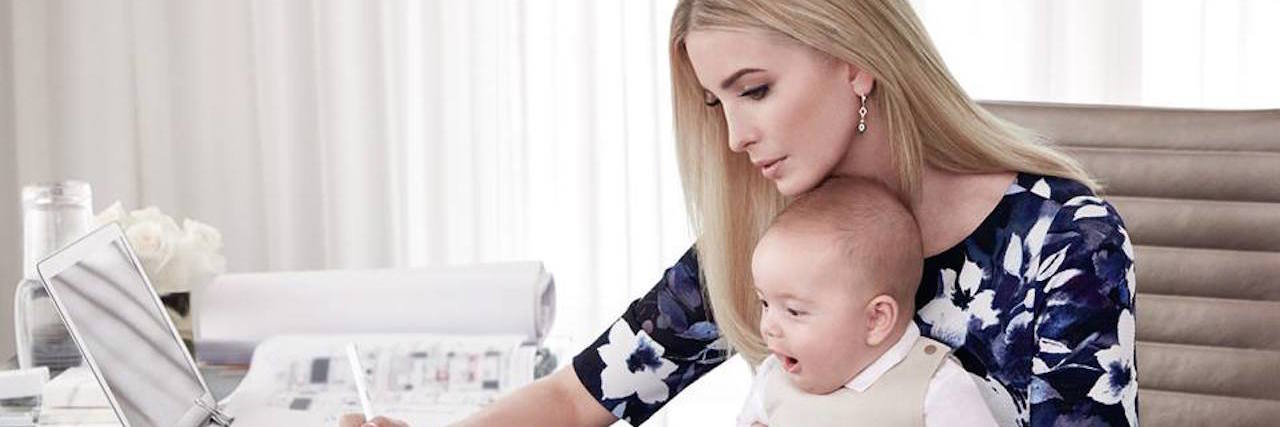We Can Criticize Ivanka Trump's Politics Without Downplaying Her Postpartum Depression
Sometimes the news isn’t as straightforward as it’s made to seem. Sarah Schuster, The Mighty’s Mental Health Editor, explains what to keep in mind if you see this topic or similar stories in your newsfeed. This is The Mighty Takeaway.
Ivanka Trump has joined the ranks of well-known women who’ve opened up about experiencing postpartum depression (PPD), including Chrissy Teigen, Adele, Hayden Panettiere and Brooke Shields. In an interview with Dr. Oz on Thursday, the president’s daughter and senior advisor revealed that with each of her three children, she experienced some degree of postpartum depression.
“It was a very challenging emotional time for me,” Trump said in the interview, “I had had such easy pregnancies, that in some way the juxtaposition hit me even harder… I felt like I was not living up to my potential as a parent or as an entrepreneur and executive.”
The reaction to Trump’s comments, typical of our political climate, was swift and opinionated. But whatever you think about her position and her politics, some of the backlash has been unfair.
Let me explain.
If we’re going to argue that mental illnesses are real, that they don’t discriminate and that people from all walks of life are affected by them… then we have to include people we don’t agree with it. Mental health issues don’t care who you are; anyone can develop a mental illness.
Whenever a celebrity or notable person speaks out about mental health, there’s always the question of accessibility. While money can’t buy happiness, it can buy you mental health treatment and child care. And of course that needs to be part of the conversation.
For example, one Twitter user made this quip: “If not for stable nannies that she employed to raise her kids, she might not of made it. #courage.”
If not for the stable of nannies that she employed to raise her kids, she might not of made it. #courage
— ????????????Boulder_Tim (@Boulder_Tim) September 20, 2017
But throwing the “money card” can be a dangerous game. Just because someone has money, doesn’t mean they won’t struggle. We can talk about how everyone should have access to mental health treatment without assuming that just because someone has a nanny, they couldn’t possibly know what depression feels like.
Some have argued her interview on the “Dr. Oz Show” is a ploy to make her more relatable and sympathetic to “everyday” moms. One Twitter user called her “narcissistic” for sharing her story.
Ivanka trying to get sympathy for her postpartum depression. I hate her, I hate her family, I hate her lack of self-awareness… #hardball
— ImpeachmentNOW! FFS! (@HappyHappyBeans) September 20, 2017
Ivanka Trump reveals her struggles with postpartum depression. Is Ivanka trying to pretend to relate to normal, everyday moms??? Clueless
— PEACE, LOVE, UNITY (@Flowerstoall) September 21, 2017
But with her post partum depression the nanny took over. Sympathy play. Ivanka has no idea what the average woman deals with/out Dr OZ
— rmc (@Thelast_try) September 20, 2017
Ivanka? Don't place your hope with her. She's off telling people her sob-tale of postpartum depression. She's as narcissistic as he is.
— ~Furyu for Democracy~ (@furyu_me) September 21, 2017
This argument, too, isn’t necessarily fair. For most celebrities, even beloved ones, being “relatable” often motivates their decision to talk about their mental health. Yes, opening up about these issues does spread awareness and can let people know they’re not alone. But we can’t pretend when most celebrities speak out, there isn’t some public relations person giving the thumbs up, imagining the sympathetic headline.
Talking about mental health doesn’t make someone a narcissist or attention-seeking. However, it’s attitudes like this that keep people in the shadows.
That all being said, and despite how understanding we should be of people who’ve struggled with their mental health, Ivanka Trump — with her access and influence over the president — isn’t a “typical” celebrity. While we don’t need to take jabs at her mental health, we should feel free to criticize the heck out of her politics.
The bill her father wants to sign would make this a preexisting condition. https://t.co/jZcL1Y3KAe
— shauna (@goldengateblond) September 21, 2017
Right now, in another attempt to repeal the Affordable Care Act, Republicans are trying to pass the Cassidy-Graham bill. Along with ending the Medicaid expansion, the bill gives states the power to stop covering essential benefits required under the Affordable Care Act. This includes both maternity care and mental health care. If 32 million people in the United States lose their health care, what’s projected under the Graham-Cassidy bill, mothers who struggle with their mental health after giving birth might not be able to afford the help Trump was lucky enough to have. And as Trump herself pointed out, “This is something that affects parents all over the country.”
JUST OUT: Here's a summary of the Graham-Cassidy repeal. Yes, it's that bad.
Spread far and wide if useful. pic.twitter.com/Z0bbj0qaPd
— Andy Slavitt (@ASlavitt) September 13, 2017
It’s one thing to spread awareness about postpartum depression, but awareness doesn’t give people health care. Ivanka isn’t an elected official, but she does act as the president’s senior advisor and has sat in important meetings and campaigned for her dad. She’s not innocent if people lose their healthcare. Holding someone responsible is not the same as diminishing their struggles, just as diminishing someone’s struggles isn’t the same as holding someone responsible.
It’s for this same reason it’s irresponsible and unfair to call Donald Trump “crazy” and “mentally ill.” Too often mental illness is used to break down someone’s legitimacy. We can criticize the president, and his daughter, without using their mental health against them.

